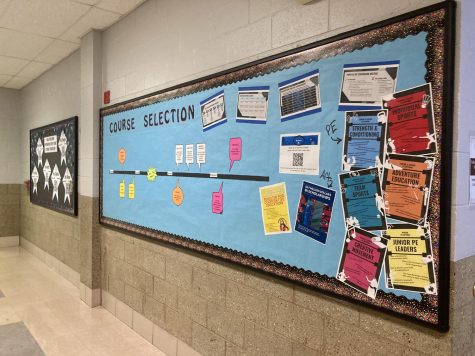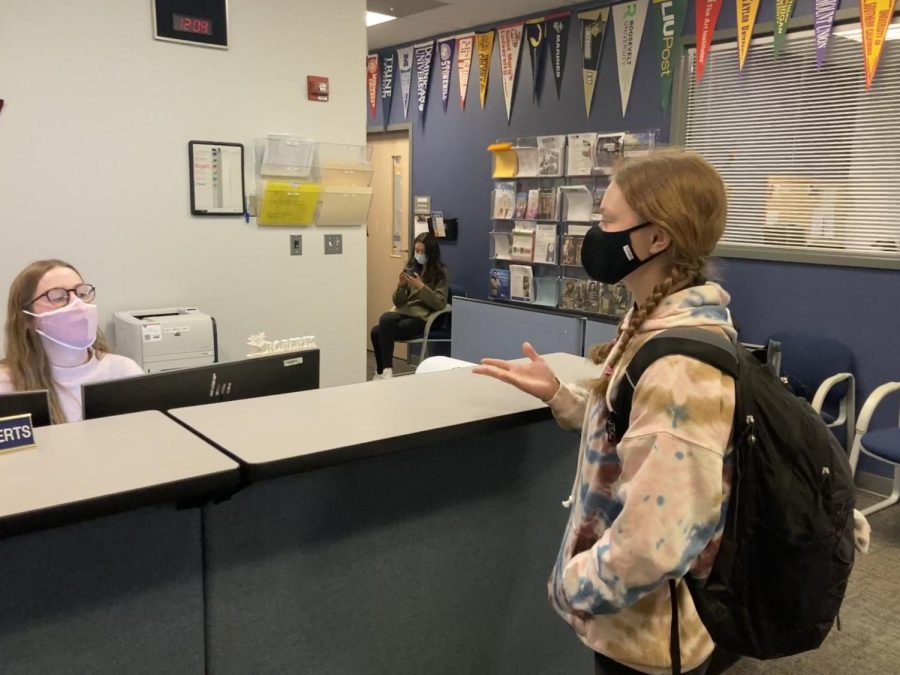Why Does Course Selection Happen So Early In The School Year?
Administrative Assistant Rebekah Roberts helps students in the College and Career Readiness office.
January 7, 2022
Course selection is the process in which students choose the classes they wish to take next school year. This process begins in early November, and class registration in HAC closes Jan. 10 for students. This early timeline leads many to wonder why the process starts so soon.
Students were first introduced to course selection through a 411 video shown Nov. 17 to prepare them for course selection.
“Sometime around Thanksgiving, we started to talk to our kids about some of the options that they have for sophomore through senior year,” said Justin Moriarty, social studies teacher.
In subsequent months, teachers showed videos and held presentations to introduce students to the various course offerings in each subject.
“The videos helped a lot. They broadened my horizons,” said Emma Laria, junior.
Students were given time to register their course selections into HAC. The deadline for HAC registration ends Jan. 10 at 7 a.m., and after this, students will begin to meet with their counselors.
Schedules will be posted with dates where students will meet with counselors. This process will begin with the juniors, then move to the sophomores, then freshmen.
“What we’ll do is we’ll look at your recommendations in terms of your core courses. We’ll have a conversation about that, and then we’ll make sure that you have all of the courses you need to meet your graduation requirements,” said Laurie Moffitt, guidance counselor.

Once classes are finalized, students will be sent home a letter in February to confirm their course choices, and they will have until Feb. 11 to make changes with their counselors.
“After we meet with all of our students and all of the courses are in HAC, then it’s out of our hands. Then, our assistant principal, Mrs. Reynolds, she works on the master schedule,” said Moffitt.
The master schedule is a listing of all the courses that will run in the year, what times they will run, where they will be located, and what teachers will be needed.
“By spring, they know how many sections of a course we’re going to have and that includes electives as well,” said Moffitt.
This information is used to see what staff will be hired, which is why the process starts so early, allowing time for larger scale administrative decisions surrounding hiring.
Despite the reasoning behind the timeline, however, many students feel that course selection takes place too soon and doesn’t give them enough time to make their decision.
“I feel like there’s a lot of time for interests to change. We’re so young; we don’t know what we want to do yet,” said Laria.
This also presents a challenge for teachers making course recommendations early in the year.
“When you’re trying to make a recommendation seven, eight months in advance, there’s a lot of development that goes into that timeframe,” said Moriarty.
Students can request changes later on in the year or request to transfer classes once the school year starts. These options are not guaranteed, though, so students are encouraged to put a lot of thought into their initial decisions.
“We encourage you to really think hard about the courses you want to take because once you put those in and once the schedule is created, it’s really hard to get into the classroom that you’ve changed your mind to,” said Moffitt.
Students take lots of factors into consideration when choosing classes, including course difficulty, post-high school plans, and advice from those around them. But most importantly, students are encouraged to choose classes that they would enjoy taking.
“As a student, it’s your high school experience. What do you want to do? What are you passionate about? I think that’s what you should pursue,” said Moriarty.



